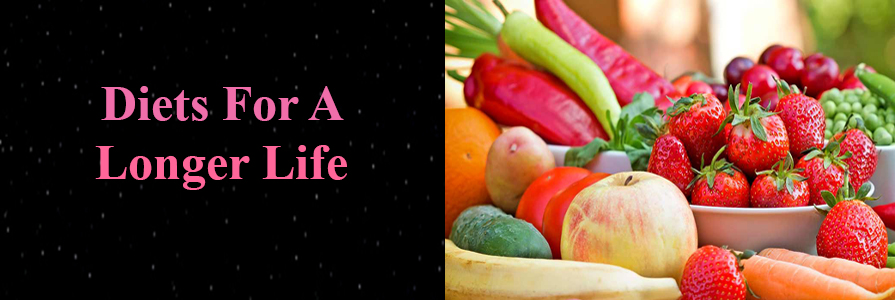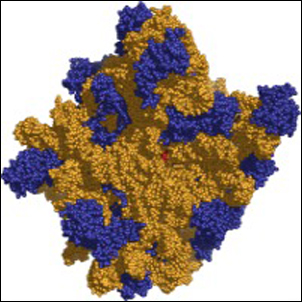
Eating Less To Live Longer

In a study at Brigham Young University conducted on mice, researchers controlled the amount of food given to two different groups. While both groups of mice were fed enough food to sustain life, one group was allowed to eat as much as they wanted. The other group was fed a limited diet called caloric restriction (CR). The mice with the restricted diet lived longer, had more energy, were healthier, and appeared “younger” than their counterparts.
One of the key components needed to sustain life is the protein which our cells produce. Proteins are found in every part of the human body from hair to organs to fingernails. It’s the critical element that allows organs to function and bodies to grow. One cell component, the ribosome (shown at the left), is responsible for the production of protein. The blue in the picture is protein and the deep gold is the RNA chain of messenger molecules. There is good news about ribosomes and bad news. The good news is that they work efficiently. The bad news is that they wear out and constantly need to be repaired.
Scientists believe that it is the wearing out/repairing process in ribosomes that impacts aging in humans. Researchers have found a correlation between the aging process and the speed with which ribosomes work. If the ribosomes slow down it appears to give them more time to repair themselves, which in the long run allows them to function longer, resulting in a longer life span.
The above study was with mice and needs to be confirmed with humans to offer conclusive proof. Additionally, there are other factors that influence lifespan and the assumption that caloric intake alone will result in a longer life is not reasonable.
A collaborative study from the University of Wisconsin-Madison and the National Institute on Aging shows that caloric restriction can also improve health and survival in rhesus monkeys. S. Jay Olshansky, an aging expert at the University of Illinois says, "We still haven’t proven that CR works the same way in humans, but we now have reasons to be optimistic that CR yields both health and longevity benefits in humans.” Top
Mediterranean Diet Plus Healthy Lifestyle Cuts Death Rate

A study published in the Journal of the American Medical Association examined mortality for 2,339 senior men and women and concluded that four factors cut mortality risk during a ten year period by more than half of that experienced by those who had adopted one or no protective practices. The four factors studied were consumption of a Mediterranean Diet, engaging in regular physical activity, moderate use of alcohol, and not smoking.
The Mediterranean Diet consists of foods commonly consumed in that region: whole grains, vegetables, nuts, fruits and olive oil. The diet is in contrast with the majority of western diets that contain relatively large amounts of meat, and refined carbohydrates such as sugar.
The current study, conducted by Kim Knoops of Wageningen University, Netherlands and colleagues, followed 1,507 men and 832 women aged 70 to 90. The researchers analyzed deaths from all causes, and separately examined deaths from coronary heart disease, cardiovascular diseases and cancer.
They found that consuming a Mediterranean diet lowered death by all causes by 23 percent, moderate alcohol use (defined as a few grams per day) was associated with a 22 percent lower risk, regular physical activity (defined as approximately 30 minutes activity per day) conferred a 37 percent lower risk and not smoking was associated with a 35 percent lower risk. Individuals who had all four of these factors lowered the risk of dying during the study period by 65 percent compared to those who practiced one or none.
The Mediterranean Diet was ranked #2 overall by US News and World Report in January, 2017. See all the top diet rankings here.
Here is the Mediterranean Diet according to CNN:
- Vegetables: At least 2 servings at each meal, some raw
- Fruit: 1 or 2 servings at each meal
- Pasta, rice or bread: 1 or 2 servings at each meal
- Olive oil with every meal
- Dairy products: 2 servings a day
- Nuts, seeds and olives: 1 or 2 servings a day
- Fish and seafood: 2 servings a week
- White meat: 2 servings a week
- Potatoes: 3 servings a week
- Red meat: Only in moderation (maximum of 2 servings a week)
- Sweets and desserts: No more than 3 servings a week
- Processed meats: Small quantities
- Fresh, local, seasonal produce
- 1.5 to 2 liters of water a day
Several animal studies have shown that eating a variety of berries is tied to better memory performance. And population studies suggest eating a single fish meal a week is good for Alzheimer's prevention. We usually think it takes a lifetime of poor dietary choices to impair our brain structure. Another recent study found significant indicators of brain damage occur just four weeks after eating the wrong kinds of food. Top
The DASH Diet Makes For A Healthy Lifestyle and A Longer Lifespan

The initial DASH diet plan was developed to lower blood pressure without medication sponsored by the US National Institutes of Health. The DASH diet research showed that it in fact could lower blood pressure as well as blood pressure medications. Since then, numerous studies have shown that the DASH diet reduces the risk of several diseases, including some types of cancer, stroke, heart failure, kidney stones, and diabetes. It has also been proven to be an effective way to lose weight and to become healthier at the same time. It is full of delicious foods. All of these benefits led the DASH diet to be the #1 diet ranked by US News & World Report in 2011, 2012, 2013, 2014 and 2017. It can be considered to be an Americanized version of the Mediterranean diet.
Several recent DASH diet research studies have optimized the DASH diet, and have shown even better results. Improved blood pressure results were obtained by cutting back on the "empty carbs" and adding in more protein and heart healthy fats. These improvements are also completely compatible with the latest research on how to achieve successful, sustainable weight loss.
The DASH diet plan is a diet rich in fruits, vegetables, low fat or nonfat dairy. It also includes whole grains, lean meats, fish, poultry, nuts and beans. It is high in fiber and low to moderate in fat. It is a plan that follows US guidelines for sodium content, along with vitamins and minerals. In addition to lowering blood pressure, the DASH eating plan lowers cholesterol and makes it very easy to lose weight.
It is a healthy way of eating, designed to be flexible enough to meet the lifestyle and food preferences of most people. The DASH diet is thought to be easier to follow than the Mediterranean diet since it has more specific guidelines. The pumped up version for weight loss is lower in calories and discourages processed foods.
Below is a sample of the first round of DASH diets. The book, DASH Diet Weight Loss Solution, features 28 days of meal plans. They are suggestions and one is free to make substitutions with favorite foods that have similar nutritional properties. This is how one learns to make the general DASH diet into a personal plan.
Breakfast
Mini-Egg Beaters Southwestern Style Omlet
Low-sodium Tomato Juice
Midmorning Snack
Light Laughing Cow Cheese Wedge
Grape Tomatoes
Lunch
Turkey and Swiss Roll-ups
Cole Slaw
Raw Snow Peas
Sugar-free Orange Jell-O
Mid-afternoon Snack
Light Cheese
Baby Carrots
Before-Dinner Snack
Guacamole
Bell Pepper Strips
Dinner
Roasted Turkey
Sauteed Carrots and Onions
Side Salad with Italian Dressing
Sugar-free Lime Jell-O
The MIND Diet Reduces The Risk Of Alzheimer's

The MIND diet takes two proven diets, the DASH and Mediterranean diets, and zeroes in on the foods in each that specifically deter Alzheimer's. The MIND diet, which stands for "Mediterranean-DASH Intervention for Neurodegenerative Delay," was developed by Martha Clare Morris, a nutritional epidemiologist at Rush University Medical Center in Chicago. The study was funded by the National Institute on Aging. The MIND diet was published online in February, 2015.
Morris' team followed the food intake of 923 Chicago-area seniors. Over four and a half years, 144 participants (16%) developed Alzheimer's disease. The longer people had followed the MIND diet patterns, the less risk they appeared to have. Even people who made "modest" changes to their diets – who would not have fit the criteria for the DASH or Mediterranean diets – had less risk of developing Alzheimer's.
The emphasis is on eating from 10 brain-healthy food groups: green leafy vegetables in particular, and all other vegetables, nuts, berries, beans, whole grains, fish, poultry, olive oil and wine. On the other hand, MIND adherents try to avoid foods from the five unhealthy groups listed below. This does not mean one can never consume any of the five bad food groups. Individuals can still follow a MIND diet if they just reduce consumption of these brain-damaging foods.
Here are the five brain-damaging foods to reduce (or avoid):
- Pastries and sweets to under five servings per week
- Red meat to under four servings per week
- Cheese to under one serving per week
- Butter or margarine to under one tablespoon per day
- Fried/fast foods to under one serving per week
The MIND Diet was ranked #3 overall by US News and Word Report in January, 2017. It was probably rated #3 because it is difficult to follow for any length of time. Ranked a tie for #4 were the TLC Diet, the Weight Watchers Diet, the Mayo Clinic Diet, and the Flexitarian Diet.
Much more information on the MIND diet can be foundhere. Top
Rush University Alzheimer's Project

The Rush Alzheimer’s Disease Core Center is one of 29 Alzheimer’s disease research centers across the country funded by the National Institute on Aging. Researchers at Rush University studied 923 participants, ages 58 to 98 years, and followed them on average for 4.5 years. Three different dietary interventions were evaluated: the Mediterranean diet, the DASH diet, and the MIND diet. The researchers then looked at the effects of these three diets on the risk of Alzheimer’s disease.
The researchers adjusted for other potential factors in their dietary study such as age, sex, education, APOE4 (genetic risk factor for Alzheimer’s disease), pre-existing cardiovascular problems, physical activity, and total dietary energy intake.
The highest level of compliance with the MIND diet conferred a significant 52% reduction in the rate of developing Alzheimer’s disease compared with participants with the lowest level of MIND dietary compliance.
For the DASH diet, the highest level of compliance resulted in a 40% reduction in Alzheimer’s disease risk. Even study subjects with “middle-of-the-road” compliance with the MIND diet, such as ingesting just some of the constituents of a brain-healthy diet like berries, had their dementia risk reduced by 35%. Participants with the highest level of compliance with the Mediterranean diet also had a significant reduction in Alzheimer’s risk in comparison with the lowest level of Mediterranean diet compliance.
The problem is that relatively few people can stick solely to healthy dietary patterns. The encouraging news is that it may not matter because just ingesting some of the constituents of the MIND diet was shown to confer considerable protection against Alzheimer's disease. Top
The Five Blue Zones

The five regions in Europe, Latin America, Asia and the US, that researchers have identified as having the highest concentrations of centenarians in the world are called the Blue Zones.
The five Blue Zone communities are:
- Ikaria, Greece
- Okinawa, Japan
- Ogliastra, Sardinia
- Loma Linda, California
- Nicoya peninsula in Costa Rica.
The people who live in the Blue Zones are quite active. They have social circles that reinforce healthy behaviors. They take time to de-stress. They're part of communities (often religious ones). And they're committed to their families.
A new book called The Blue Zones Solution by Dan Buettner, a National Geographic explorer and author, is aimed at Americans and is mostly about eating. Why should we pay attention to what the people in the relatively isolated Blue Zone communities eat? Because, their more traditional diets harken back to an era before we Americans were inundated with greasy fast foods and sugar.
To qualify as a Blue Zone, these communities have to be largely free of afflictions like heart disease, obesity, cancer and diabetes. So clearly they're doing something right.
What are these people doing to live up to 115 years old? They are mostly eating differently.
- The Okinawa diet contains a lot of vegetables, rice and fish - producing dishes that are rich in protein, but low in calories.
- People in the Nicoya peninsula in Costa Rica eat early and minimally. Their diet includes beans, yams and small portions of meat.
- Both Ikaria, Greece, and Sardinia, Italy, pride themselves on living by the Mediterranean diet that's rich in fish, vegetables, and whole grains - with moderate amounts of alcohol.
- Lastly, residents of Loma Linda, California, have a traditionally low-fat, vegan diet, where they avoid meat and dairy products as much as possible.
For more information on the Blue Zones "Food Guidelines" visit the Blue Zones web site. Top
Our Brain - No Help When Dieting

A study carried out in mice may help explain why dieting can be an inefficient way to lose weight: key brain cells act as a trigger to prevent burning calories when food is scarce. "Weight loss strategies are often inefficient because the body works like a thermostat and couples the amount of calories we burn to the amount of calories we eat," says Dr Blouet, from the Metabolic Research Laboratories at the University of Cambridge in the UK, who led the study.
"When we eat less, our body compensates and burns fewer calories, which makes losing weight harder. We know that the brain must regulate this caloric thermostat, but how it adjusts calorie burning to the amount of food we've eaten has been something of a mystery", says Dr Blouet.
"Our findings suggest that a group of neurons in the brain coordinate appetite and energy expenditure, and can turn a switch on and off to burn or spare calories depending on what's available in the environment," says Dr Blouet, "If food is available, they make us eat, and if food is scarce, they turn our body into saving mode and stop us from burning fat."
"While this mechanism may have evolved to help us cope with famine during our early days, nowadays most people only encounter such a situation when they are deliberately dieting to lose weight. Our work helps explain why, for these people, dieting has little effect on its own over a long period. Our bodies compensate for the reduction in calories."
The best solution for people to lose weight, at least for those who are only moderately overweight, is a combination of exercise and a moderate reduction in caloric intake.